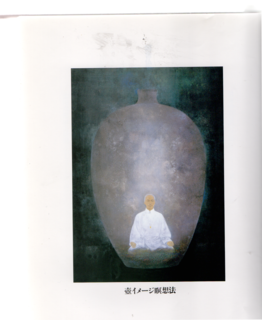
ツァラトゥストラと阿含経
宗教というものが、たんなる聖人君子、あるいは、謹厳実直なマジメ人間をつくり出すだ
けのものならば、そんな宗教なぞ、なんの魅力もないと思った時期があった。ごく若い頃の
ことである。
それには、二つのものが原因している。
菊地寛の短篇小説に、極楽に往生れた男の話かおる。
あまりにも平穏無事な日がつづく極楽の生活に退屈した男が、先に来ていた男に質問する。
「この生活がいつまでつづくのですか?」
先輩は、男をじっと見て答える。
「いつまでも、だ」
男は、地獄に生まれていたほうがよかったのではないかと、ふと思う、というのである。
もう一つは、ニーチェの「ツァラトゥストラ」であった。
当時、十代から二十代にかけての若者達の間に、ニーチェに心酔する者がおびただしかっ
た。私もその中の一人であった。
ニーチェは、「ツァラトゥストラ」を音楽に見立てることもできるといい、ぺ1夕1・カス
トにあてた手紙では、音楽のどの種類に入れたものか、おそらく交響楽だろうか、などと書
いているというが、この交響楽は二つのテーマから成り立っている。一つは、「超人」であり、
{つは「永劫回帰」である。
ツァラトゥストラはいっている。
「わたしはあなたがたに超人を教えよう。人間は克服されなければならない或るものなのだ。
あなたがたは、人間を克服するために、何をしたというのか?」(「ツァラトゥストラの序説」)
また、ツァラトゥストラは、こういう。
「超人は、人間という。暗雲”からひらめく。稲妻”と。狂気”である。人間は動物と超人
とのあいだに張りわたされた一本の綱なのだ」
ツァラトゥストラは、さらにいう。
「およそ生あるものはこれまで、おのれを乗り超えて、より高い何ものかを創ってきた。と
ころがあなたがたは、この大きい潮の引き潮になろうとするのか。人間を乗り超えるより、
むしろ獣類に帰ろうとするのか。
人間にとって猿とは何か。咲笑の種、または苦痛にみちた恥辱である。超人にとって、人
間とはまさにそういうものなのだ。
あなたがたは虫から人間への道をたどってきた。だがあなたがたの内部にはまだ多量の虫
がうごめいている。またかつてあなたがたは猿であった。しかも、いまも人間は、どんな猿
にくらべてもそれ以上に猿である。
あなたがたのなかの最も賢い者も、植物と幽霊との継ぎはぎであり、混種であるにすぎぬ。
だが、わたしはあなたがたに幽霊になれ、もしくは植物になれと命じるだろうか?
聞け、わたしはあなたがたに超人を教える」
まだ十代の未熟な若者にすぎなかった私には、超人というものがどんなものか、よく理解
しがたかったが、ニーチェの説く言葉の一節一節に、私は、果てしない心の高揚を感じた。
当時、不治の病といわれた結核の病床にあって、苦しみの日々を送っていた私は、ニーチ
ェの説く「力への意志」に、生きる勇気を鼓舞された。日々自殺を考える私に生き抜く希望
をあたえてくれたのは、ニーチェたった。ニーチェはこういう。
「苦しみの、大いなる苦しみの規律―‐‐―L‐この規律だけが今まで人間の高揚を創造したことを、
あなたがたは知っているのか?」
ニーチェは、苦しみを通じて、大いなる苦しみの規律を通じて何かが創造されることを示
唆するのである。苦痛の存在しない状態は、決して理想ではない。人は大いなる苦しみを通
じてより高い自己を創造するのだ。
人間の新たな可能性を志向するこの超人を導く原理は、生と芸術の根源にひそむ「力への
意志」であり、それは苦しみを超克することにより創造されてゆく。その果てに、超人があ
病み疲れた心身が、超人を想うとき、大のように熱く燃えた。
その私か困惑したのは、もう一つのテーマ、「永劫回帰」ewige Wiederkunftであった。
ニーチエはいう。
「ある日あるいはある夜、ある悪魔があなたのもっとも孤独な孤独のなかに忍び足であなた
のあとをつけて、あなたにつぎのように言うとしたらどうであろうか。
‘‐‐――あなたが今生き、そして今まで生きて来たようなこの人生を、あなたはもう一度そして更に無数の回数生きねばならないであろう。そして、それには何一つ新しいものはない。
しかし、すべての苦痛およびすべての歓喜およびすべての思想および嘆息およびあなたの人
生のすべての言葉に尽くしがたい小さなことと大きなことは、あなたに帰って来なければな
らない。しかも、一切は同一の順序および連続において−1−そして、木々の間のこの蜘蛛お
よびこの月光でさえ、そしてこの瞬間およびわたし自身でさえその通りなのだ。存在の永遠
の砂時計は、くり返しくり返し回転させられる
の細かいちりよ!」
そして、それと共なるあなた、ちりの中
あとがき
三四九
同一の出来事が、全く同じように永遠にくり返されるというのが、ニーチェの永劫回帰の
思想である。
われわれの人生には、始めもなければ終わりもない。それはただ、永遠に回転するのみで
ある。そして、もしも一切の事物が回帰するとすれば、現在ここで起こっていることは、以
前にすでに無数の回数において全くおなじように起こっていたのであり、しかもそれは未来
においても果てしなくくり返されるはずである。とすれば、われわれの生存にはなんの意義
もなければ目的もないということになるのではなかろうか?
て私か超人を志向するということは、どういうことになるのであろう
それはかつて過去に無数回、私は超人を志向したということであり、また未来においても
無数回、超人志向をくり返すということなのだろうか。それならそんな無意味なことはもう
止めようということになれば、それもまた過去において無数回くり返してきたことなのか。
とすれば、超人になるということ自体、無意味なことになってしまうのではないか。
それとも?
超人になった瞬間、私は永劫回帰の環の中から飛び出して、別な存在になってしまうのか?
超人と永劫回帰の矛盾をどう解いたらよいのか。病床で必死に考えながら、私の超人志向
はますます燃えさかるのだった。
手塚富雄氏と三島由紀夫氏が、つぎのような対談をされている。
三島 ニーチェが『ツァラトゥストラ』のあとで、もしインド哲学に親しんだら、どう
いうことになったでしょうか。たとえば大乗仏教やなんかの唯識に興味をもったら
おもしろかったでしょうね……。
手塚 そうですね。晩年にインドの聖典を読んで、非常におもしろかっています。それ
が発展するまでにはいかなかったようですけど。永劫回帰の思想など東洋の思想に
非常に近づくようなところがあるんですね。 (『ニーチエ』付録I)
『ニーチェと仏教』(湯田豊著)によれば、ニーチェは、大乗仏教はまったく知らなかったが、
十九世紀のヨーロッパ仏教は、かなり深く知っていたようである。当時のヨーロッパ仏教は、
上座仏教であるという。
私は、上座仏教というより、根本仏教の阿合を読んでいたら、ツァラトゥストラはまった
く変わっていたのではないかと思う。上座仏教と阿含仏教を同一視する人もいるようだが、
この両者はまったくちがうのである。ひと口でいうと、上座仏教は釈尊の成仏法を捨てて、
戒律仏教になってしまっている。阿含仏教は、成仏法を中心とするのである。
釈尊の成仏法を知ったら、ニーチェの思想は一変していたのではなかろうか。
湯田豊氏は、ニーチェと仏教との関わりについて、非常に精緻な研究をされている。それ
によると、戒律と教学を主とする上座仏教をもとに、ニーチェは論じているようである。阿含仏教の成仏法を知っていたら、とくれぐれも残念である。
というのは、私自身の体験から出ている考えである。
私は、ニーチェの説く超人に、若い血をたぎらせたのであるが、ニーチェは、超人を教え
るといっていながら、超人になる方法は教えなかった。
わずかに、「精神の三段の変化」について語っているだけである。
ツァラトゥストラは、こうのべる。
「わたしはあなたがたに、精神の三段の変化について語ろう。
すなわち、どのようにして精神が駱駝となるのか、どのようにして駱駝が獅子となるのか、
そしてどのようにして最後に獅子が幼な子になるのか、ということである」
しかし、これも結局は、論説であり、教説である。釈尊の教えた成仏法のような「方法」
ではない。
私か宗教の門をくぐった時、若い頃からの超人志向が潜在意識にあった。
潜在意識にあったというのは、ストレートに超人になる法を求めて、宗教に人つたのでは
ないという意味である。ほかに求めるものがあっだのだが、同時に、心の底に、ニーチェの超人主義、超越主義があったことはまちがいない。そういう目で、私は、宗教を見ていたの
であろう。
まもなく、私は、密教にそれを発見した。
それからさらに源流にとさかのぼり、阿合仏教に到達して、釈尊の成仏法を発見した。
成仏したということと、超人になったということは、当然ちがう。
しかし、釈尊の成仏法が、ある過程において、超人をつくり出す、ということは、まちが
いない。
ニーチェの永劫回帰論は、仏教の「輪廻論」とほとんど変わらない。ただ仏教にくらべて
業と因縁の理論が欠けているため、非常に窮屈になっているのではなかろうか。
ニーチェはそうしなかったが、「ツァラトゥストラ」は、瞑想法の宝庫といってよい。ニー
チェは、「ツァラトゥストラ」を音楽になぞらえたが、私は、じつに豊富なヴィジョンをあた
えてくれる思索の宝庫と思う。
さきにあげた「精神の三段の変化」を、私は、瞑想法として構成した。ほかにも、いくつ
かある。これらは、私かニーチェに代わってつくった超人になる法−1−「超人法」といって阿合仏教・超能力の秘密
いいかもしれない。
阿合宗の超能力指向を、ニーチェの超人主義に思い至らず、
などと同一視して軽蔑的な言辞を弄していた文化人や知識人、
三五四
ユリーゲラーのスプーン曲げ
一部のマスコミ人などがいた
としたら、阿合宗は逆にかれらを心の底から軽蔑し、わらっていたのだといっておこう。
一九九六年一月十日
著者しるす
ニーチェに関する訳文・引用など、左記の著書に拠った。諸先生に厚く御礼を申し上げる。
手塚富雄編『ニーチェ』(「世界の名著46」)中央公論社
氷上英廣訳『ツァラトゥストラはこう言った 上・下』岩波文庫
湯田豊『ニーチェと仏教』世界聖典刊行協会
Zaratustra and Agama
Religion creates a mere saint prince, or a strict and honest human being.
There was a time when I thought that such a religion had no appeal if it was a mere thing. When I was very young
That is.
It is caused by two things.
The story of a man who was born in paradise in a short story by Hiroshi Kikuchi.
A man who is bored with a paradise life where the days are so peaceful asks the man who came earlier.
"How long will this life last?"
The senior looks at the man and answers.
"Forever"
He wonders if the man should have been born in hell.
The other was Nietzsche's "Zaratustra".
At that time, there were a large number of young people in their teens and twenties who were fascinated by Nietzsche.
Ta. I was one of them.
Nietzsche says that "Zaratustra" can be likened to music, Pe 1 Evening 1 Kas
In a letter he wrote to To, what kind of music he put in, perhaps symphony, etc.
However, this symphony consists of two themes. One is "superhuman",
{One is "eternal return".
Zaratustra is on.
"I will teach you superhumans. Humans are something that must be overcome.
What did you do to overcome humans? ("Introduction to Zaratustra")
Also, Zarathustra is like this.
Inspiration from "superhumans are humans. Dark clouds". Lightning "and. Madness". Humans are animals and superhumans
It's a rope stretched between them. "
Zarathustra says further.
"About living things have overcome themselves and created something higher."
Are you going to be the ebb tide of this big tide? Rather than overcoming humans
Rather, are they going to return to beasts?
What is a monkey for humans? It's a seed of laughter, or a painful shame. For superhumans, people
That's exactly what the ken is.
You have followed the path from insects to humans. But there are still a lot of bugs inside you
I'm moving. And once you were monkeys. What's more, humans are still what kind of monkeys
Even more than that, he is a monkey.
The wisest of you is also a seam between plants and ghosts, a hybrid.
But will I command you to be a ghost or a plant?
Listen, I will teach you superhumans "
For me, who was just a teenage immature young man, I understood what a superhuman is like.
It was difficult, but I felt an endless uplifting feeling in every passage of Nietzsche's words.
At that time, I was in a bed of tuberculosis, which was said to be an incurable disease, and I was suffering every day.
I was inspired by the courage to live by the "will to power" that I preached. Hope to survive for me who thinks about suicide every day
It was Nietzsche who gave me this. Nietzsche is like this.
"The discipline of great suffering of suffering --- L-that only this discipline has ever created human uplifting.
Do you know "
Nietzsche shows that through suffering, something is created through the discipline of great suffering
Incite. The absence of pain is by no means ideal. One goes through great suffering
Create a higher self.
The principle that guides this superhuman who is oriented toward new possibilities for human beings is the "to power" hidden in the roots of life and art.
It is "will", which is created by overcoming suffering. At the end, there is a superhuman
The sick and tired mind and body burned like a big when thinking of a superhuman.
What confused me was another theme, "eternal return" ewige Wiederkunft.
Nichie says.
"One day or one night, a devil sneaks into your most lonely loneliness.
What if you follow and say to you:
‘--- You will have to live this life as if you were living now and have lived until now, once again and countless times. And there is nothing new in it.
But all the pain and all the joy and all the thoughts and sighs and yours
The small and big things that are indescribable in all the words of life must come back to you
Not. What's more, all in the same order and sequence -1-and this spider between the trees
And even this moonlight, and this moment and even myself. Eternity of existence
Hourglass can be rotated over and over again
Fine dust! "
And you who are with it, in the dust
Afterword
349
Nietzsche's eternal return is that the same event is repeated forever in exactly the same way.
It is an idea.
Our life has neither a beginning nor an end. It just spins forever
is there. And if all things return, what's happening here now is
It had already happened innumerably many times before, and it was the future.
It should be repeated endlessly. If so, what is the significance of our survival?
Doesn't it mean that there is no purpose or purpose?
What does it mean to be oriented towards me or a superhuman?
It means that I once aimed at superhumans countless times in the past, and also in the future
Does it mean repeating superhuman orientation countless times? Then that meaningless thing is already
If it comes to stopping, is it something that has been repeated countless times in the past?
If so, it would be meaningless to become a superhuman.
Or is it?
At the moment of becoming a superhuman, will I jump out of the ring of eternal return and become another existence?
How should we resolve the contradiction between superhumans and eternal return? While thinking desperately on the bed, my superhuman orientation
It was burning more and more.
Tomio Tezuka and Yukio Mishima have the following dialogue.
What if Nietzsche Mishima became familiar with Indian philosophy after "Zaratustra"?
Did you mean that? For example, if you are interested in Mahayana Buddhism or something else
It would have been interesting ...
Tezuka That's right. I read the Indian scriptures in my later years and it is very interesting. It
It seems that it didn't go until it developed. For oriental ideas such as the idea of eternal return
There is a place that is very close. ("Nichie" Appendix I)
According to "Nietzsche and Buddhism" (written by Yutaka Yuda), Nietzsche did not know Mahayana Buddhism at all,
European Buddhism in the nineteenth century seems to have known him quite deeply. European Buddhism at that time
It is said to be Theravada Buddhism.
I was addicted to Zaratustra when I was reading Aai in Early Buddhism rather than Theravada Buddhism
I think it has changed a lot. It seems that some people equate Theravada Buddhism with Agama Buddhism,
The two are completely different. In a nutshell, Theravada Buddhism abandoned the Buddhahood of Shason,
It has become a precept Buddhism. Agama Buddhism is centered on the Buddhahood method.
If I knew the Buddhahood method of Shason, Nietzsche's thought might have changed completely.
Yutaka Yuda has been doing very detailed research on the relationship between Niche and Buddhism. It
According to Nietzsche, Nietzsche seems to argue based on Theravada Buddhism, which focuses on precepts and teaching. It would be a shame if I knew the Buddhahood method of Agama Buddhism.
That is an idea that comes from my own experience.
I made Nietzsche's superhuman bleed young, but Nietzsche taught him superhuman.
But he didn't teach me how to be superhuman.
It only talks about "three-step changes in spirit".
Zarathustra is like this.
"I will tell you about the three steps of change in spirit.
That is, how the spirit becomes a camel, how the camel becomes a lion,
And how does the lion finally become a young child? "
However, this is also an editorial and a doctrine after all. "Method" like the Buddhahood method taught by Shakuson
is not.
When I passed through the gate of religion, I had a subconscious mind of superhumanism from a young age.
The subconscious was that he was a religion in search of a law to become a superhuman straightforwardly.
It means no. There was something else I wanted, but at the same time, there was no doubt that Nietzsche's transcendentalism and transcendentalism were at the bottom of my heart. With that in mind, I was looking at religion
Will.
Soon, I discovered it in esoteric Buddhism.
Then, going back to the source, we reached Aai Buddhism and discovered the Buddhahood method of Shason.
Of course, there is a difference between being a Buddhahood and becoming a superhuman.
However, it is a mistake that the Buddhahood method of Shakuson creates superhumans in a certain process.
Not in.
Nietzsche's theory of eternal return is almost the same as the Buddhist theory of reincarnation. Just compared to Buddhism
Isn't it very cramped because of the lack of theory of karma and fate?
Nietzsche did not do so, but "Zaratustra" can be said to be a treasure trove of meditation methods. knee
Choi likened "Zaratustra" to music, but I had a rich vision.
I think it's a treasure trove of thought.
I constructed the "three-step change of spirit" mentioned earlier as a meditation method. How many others
There is. These are the methods of becoming superhumans created on behalf of me or Nietzsche-1-the secret of Aai Buddhism and psychic powers called "superhuman law"
It may be good.
Agon Shu's psychic orientation did not come to Nietzsche's superhumanism,
Cultural people and intellectuals who were equating with such things as contemptuous words,
354
Yuri Geller's spoon bending
There were some media people
If so, let's say that Agon Shu, on the contrary, looked down on them from the bottom of his heart and shook them.
January 10, 1996
Author
Based on the book on the left, including translations and quotations about Nietzsche. We would like to express our sincere gratitude to all the teachers.
Tomio Tezuka ed. "Nietzsche" ("World Famous Books 46") Chuokoron-sha
Translated by Hidehiro Hikami, "Zaratustra said this, above and below" Iwanami Bunko
Yutaka Yuda "Niche and Buddhism" World Scripture Publishing Association
【このカテゴリーの最新記事】
-
no image
-
no image
-
no image
-
no image
-
no image




